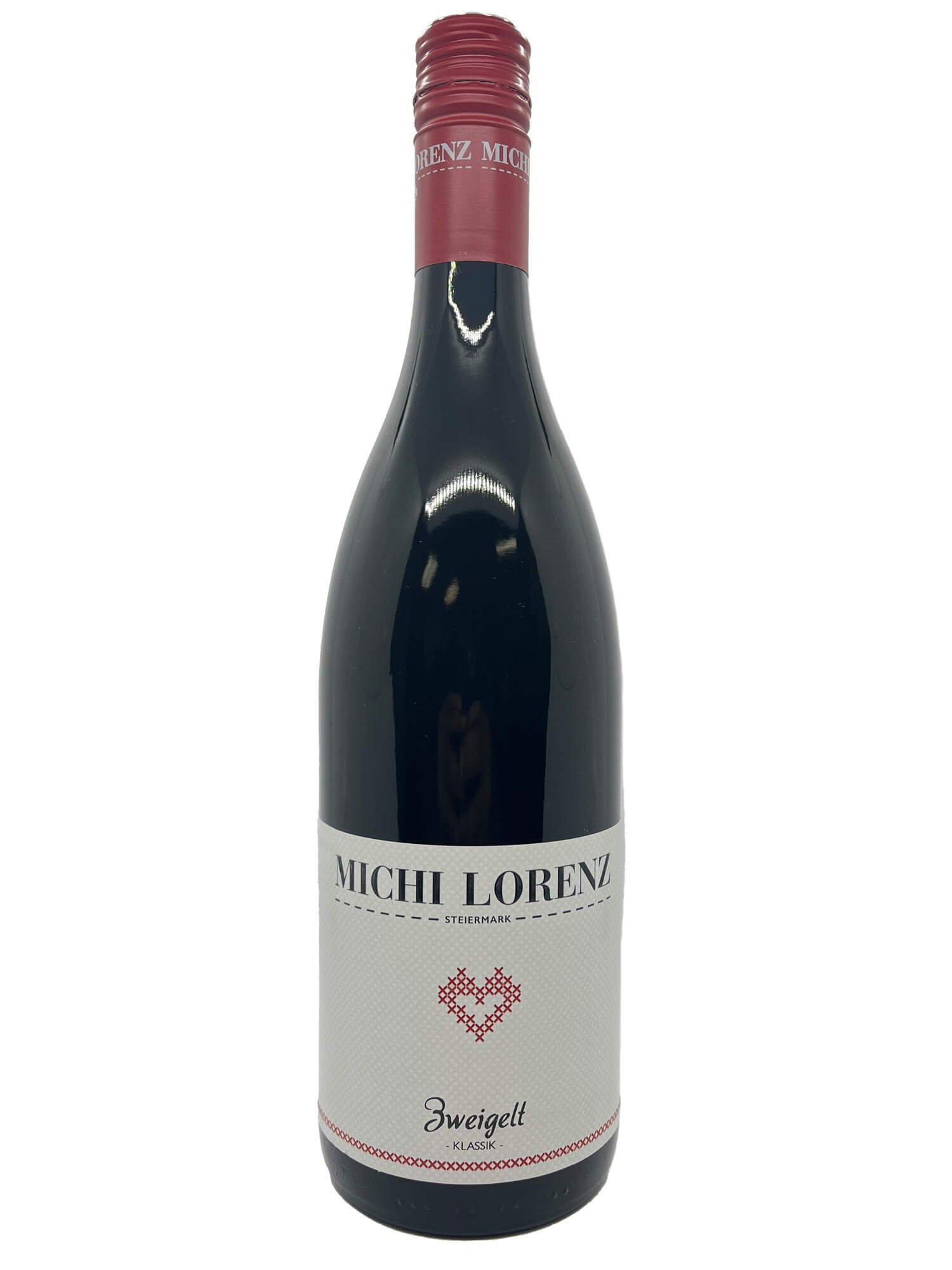A Rock Star Natural Winemaker
South Styrian winemaker Michi Lorenz
As a young man growing up in a winemaking family in a beautiful and picturesque grape-growing region in Austria, Michi Lorenz had a dream, as many young men do, to become a rock star. Music was his passion. But with a 500 year history in his family of making wine on his family’s property, having parents who were looking to “pass on” their vineyards and winery to their children, and with his own love of wine and wine culture, Michi realized that his destiny wasn’t to be on a stage at an international music festival. At least, not yet. His imminent future stage would look a little different.
His “melodies” would be from the natural rhythm of the vineyard cycle, his “movements” from the rushing noises of harvest, and, his commitment to producing natural wine would rise like a crescendo with the resulting wines creating a perfect pitch.
Several years later, he’s made it to that worldwide stage, with a glass in hand as a trailblazer for the “natural wine” movement in Austria.
We were inspired as we talked and tasted with Michi Lorenz at our VeroTalk with him this past week. Here are the highlights of what we learned about him, his family, his land and his wines.
The Man… The Wines… The Music.
Although his family’s property has been planted in vines since 1524, it was really his grandfather who turned the vineyards and winery into an actual business shortly after World War II. Michi’s father followed suit but concentrated on red wines whereas Michi himself currently produces more white wines. After talking with Michi, he seemed to accept that with global warming upon us more red wines might be forthcoming but for now, and certainly many years into the future, white wine will be his mainstay.
And, natural, organic, and biodynamic wines, are his passion.
Which is why he is in the perfect region to produce such wines. Austria is a landlocked country with mostly a continental climate due to the high alps in the West and with much of its vineyards situated on the Pannonian plains of Central Europe to the North and East. The vineyards Michi’s family has worked and owned for centuries lie in the southernmost wine region in Austria known as Styria or Steiermark, which borders Northern Slovenia. This region is hilly and has some smaller mountains -- what Californian’s would call “foothills”. While a rather small wine producing district with only 4,600 hectares (11,400 acres), it does rank, though, as Austria’s 3rd largest wine producing area and Austria’s most famous Sauvignon Blanc producing region.
Michi’s house, perched on the top of an Austrian hillside.
In this Styrian South, or Südsteiermark in German, vineyards are influenced by a more Mediterranean or “temperate” climate as the Adriatic Sea is a mere 198 miles away. Michi’s vineyards are located in Kitzeck in Sausal which has the highest peaks in the region and his vineyards are all 620 meters above sea-level (2034 feet). Some of his vineyards are south facing slopes and literally vertical – reminiscent of the very vertical slopes adjacent to the rivers in Germany. According to Michi, “our vineyards get plenty of rain and the difference during the growing season between the daytime high and the nighttime low is significant which allows our grapes to get ripe but still maintain beautiful acidity”. The soils in his vineyards are variables of slate/schist – grey schist, red schist and black schist, and each adds a different character to the scents and flavors of the grapes, and thus the wines, from beautiful acidity to this unusual but lovey smokiness. We only tasted four of his wines but the terroir of this region came through without hesitation.
Producing demeter (biodynamic) wines isn’t easy in Austria as, according to Michi, it has the strictest biodynamic laws in the wine world. But Michi is a believer, as he has seen the positive effect and the difference in his grapes in the short time he has been certified. Prior to the demeter certification, since the year 2003, Michi was doing as much as he could, in the vineyards and winery, to be organic and biodynamic. He was finally able to move the vineyards to 100% with the vintages of 2020, 2021 and 2022; according to Michi, “grapes from these vintages were the best I have ever seen”.
One of Michi’s Sauvignon Blanc vineyards.
To have a vineyard farmed biodynamic, it requires a lot more time for the winemaker or vineyard manager to have boots on the ground and hands in the vineyard. Without the use of pesticides and the like, winemakers and vineyard managers need to be proactive to prevent pests, deal with weeds and thwart fungus. Without the use of anything artificial, a huge emphasis has to be placed on canopy management. In order to prevent mildew from growing on the leaves and grapes in the vineyard after a rain, leaves might need to be thinned. To keep those same grapes from getting sunburned, the leaves might need gentle hands to rearrange their growth projection. With more time spent in the biodynamic vineyard than might be the case for a commercial vineyard, the winemaker/vineyardist is going to become more aware of all the potential issues to his/her vines. Basically, more acute attention to the vineyard keeps the majority of the problems away without the use of chemicals. Michi is well aware of the patience and time required to farm biodynamic and is convinced that his extra effort is paying off in his wines.
His patience comes through at harvest as well. Most winemakers/vineyardists will choose the best overall time to pick the grapes in a specific vineyard averaging out the grapes that are too ripe with the grapes that are not yet fully developed and hoping that the majority of grapes are at their perfect maturity. Michi, however, takes the time to make three passes through his vineyards picking only the mature grapes on each pass. Thus, the resulting wines express more of the true “terroir” of his vineyards as more of his grapes are brought in at their perfect physical and physiological ripeness.
That same intense attention given to the vineyards is required in the winery to make natural wine. Attention but not interference. Natural wine producers truly try to let the grapes and their natural yeast “go it alone”. Rather than interfere, they “accompany” the must as it begins to ferment and create wine. Michi’s wines are made with the natural yeast from his vineyards (his wines are not inoculated with commercial yeast) and have the bare minimum of sulfur – mainly coming from the sulfur that already exists in the environment. Most commercially made wines range from 150 to 180 ml of sulfur but his wines are under 50 mg/l with most coming in at 10 mg/l.
Michi with a cluster of sauvignon blanc grapes.
Natural wines by law in Austria are not allowed to state vineyard names on their labels so Michi has had to create proprietary names for each wine, something that doesn’t seem to have been difficult for him. After having interviewed him for less than an hour during our VeroTalk with him, it was quite obvious that this winemaker has a creative and dynamic personality. His personality comes across in the names he’s given his wines. They are fun and apropos.
Then he told us the sweet story that goes along with embroidered heart on the label. Rather than go with a traditional Austrian wine label (drawing of the winery and verbiage) or a more American cultural label (in Michi’s case, a rock star perhaps?), he chose the embroidered heart which is culturally recognizable from Austria and seems dear to him. It wouldn’t surprise us though if in the future some of his wines have a rock star theme.
A Rock Star Wine Tasting
Sommelier Roxanne Langer guided us through the wine tasting of Michi’s wines during our VeroTalk with him. She comments “Having interviewed 100’s of winemakers in my career, Michi was the first to use a musical simile to describe the yearly wine vintage.” In fact, Michi said very fervently, “it’s as though I’m releasing a new album every year”.
With guitars within arm’s reach in every room in his house and cellar, his passion plays on in his wines. He’s a rock star winemaker who may someday be on a stage with both a wine glass and a guitar.
Sauvignon Blanc Klassik
Roxanne: “Slightly smoky on the nose with herbaceous and green fruit. Palate amplifies the green fruit with green apple, soft lime and minerality. Long finish, easy to drink with lots of character. This would be a great wine to serve with the more difficult vegetable pairings such as asparagus and artichokes, even salads with non-creamy dressings.”
Schist Happens
Michi: “This wine is non-vintage and includes wine from the several vintages as well as the current vintage and has some skin contact. The varietal is Sauvignon blanc but the idea was not to produce a varietal “Sauvignon blanc” but rather a solera style non-vintage wine. With this wine, it is much more important to me to show the terroir of the region. Both stainless steel and barrel ferments but only 20% of the latter in neutral oak. Reminds me of Pink Floyd.”
Roxanne: “Smoky on the nose with more complex scents than the Klassik. More golden color due to the solera influence. Very minerally on the attack but slowly moves to fruitiness. Great acidity even with the blended older vintages. Nice medium length finish.”
The ‘Halo’ of light from a local church that inspired the name of Michi’s orange wine.
Halo Sauvignon Blanc
Michi: “The name came from a view from the vineyard of our village church up on a hill. One evening I was in the vineyard and the moon was out and I could see the church upward in the distance and it had this incredible “halo” light-with-fog effect over the top of the steeple. I knew at the moment what I would be naming the wine!”
Roxanne: “The nose is reductive with more fruits and herbs. The palate is intense with layers of dried fruit and green floral. Beautiful long finish. I think this wine should be decanted or at least swirled frequently in the glass as its scents and flavors change with each swirl.”
Michi: “A lot of surprises in this wine, sometimes in your face but in the end you will say it is amazing! Only 11.9% alcohol but great long finish. This wine reminds me of David Bowie: lots of suprising things yet amazing.”
Zweigelt
Roxanne: “Beautiful smokiness (from the soils) on the nose with concentrated red fruit in fact, very fruit driven.
On the palate, cranberry, deep red cherry, spiciness, slight back pepper but ends with a white pepper finish. Would pair well with both pork and meat dishes and perfectly with duck and a cherry compote.”
Michi: “As with all my wines, the Zweigelt has a bit vibration on the tongue which comes from the minerality of the schist soils.”
Michi Lorenz is Making his US Debut with Vero
We are thrilled to have discovered Michi Lorenz and to have been the first to import his organic and biodynamic wines to the USA. We sell them to businesses and consumers across the US. Buy his wines online here. If you work in the wine trade, contact us to taste his wines and get pricing.
This article is written by sommelier Roxanne Langer, founder of Lady Somm wine consultancy and the Carmel Wine School.









